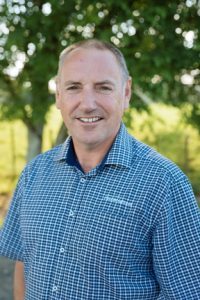Farmers have made a mind-set change to cope with the threat of Mycoplasma bovis when buying stock. Anne Lee reports.
Farmers are asking many more questions and demanding assurances over biosecurity history when considering bull purchases or leasing arrangements this season.
Calf buyers, too, are wanting more detail when making buying decisions.
PGG Wrightson national dairy livestock manager Paul Edwards says there has been a major mind-set change in the way farmers are going about their business since the Government decision earlier this year to continue with a Mycoplasma bovis (M bovis) eradication plan.
It’s become particularly evident as farmers start making arrangements for this year’s mating and as calf-rearers buy this season’s offspring.
While more dairy farmers are expected to elect an all artificial insemination (AI) programme this mating there’s still strong inquiry for service bulls, Edwards says.
‘There’s recognition that this is a bovine issue and not just one affecting the dairy industry now. We’re seeing farmers across the board demanding a lot more history and a lot more information than before.’
That inquiry has come earlier this season as farmers want to get in while there are still good numbers of bulls to choose from so they secure animals they’re more confident have very low biosecurity risk.

“Farmers want a lot more detail not just about the animals themselves but the status of the property, how its managed in terms of animal movements and whether it has been under any investigation by MPI,” Edwards says.
“They need enough information to give them a level of comfort about the risk.”
John McKerchar from Shrimpton’s Hills Herefords – producers of short-gestation Hereford bulls – says dairy farmers are being cautious and looking for a greater level of information on biosecurity factors than they have in the past.
Their sire bulls have undergone three tests and, apart from imported certified semen, the herd is closed, he says.
They’ll be including the measures they take to mitigate biosecurity risk this year in the catalogue for their September sale.
Mike Connor from Hawke’s Bay company Service Bulls NZ says farmers quite rightly should be asking about where the animals they bring on to their farms have come from and how they’ve been managed right from birth through to the day they arrive on their property.
They supply about 2000 Jersey, Friesian and crossbred bulls for lease to dairy farmers across the North Island each year, rearing them from four-days-old.
They have closely surveyed each of the farmers they source bull calves from in terms of rearing practices including questions relating to the milk they’ve been fed, farm management practices, recording of animal movements and status.
Connor says he’s also tested 10% of each mob he has on the operation using the PCR test on nasal samples.
The extra level of confidence he requires and higher biosecurity bar he’s set means he’s expecting demand to outstrip his ability to supply this season.
He’s not anticipating a drop off in demand but is ready for the additional questions farmers will have.
In terms of calf sales, Edwards says rearers want a high level of detail around traceability, whether the animals come from vendors with closed herds, how the calves have been managed and the status of the property.
Stock are still selling through the saleyards and agents are doing a lot of work to collect information to accompany animal status declaration (ASD) and NAIT forms before animals leave properties for the yards.
“There’s recognition that this is a bovine issue and not just one affecting the dairy industry now. We’re seeing farmers across the board demanding a lot more history and a lot more information than before.
“Regardless of M bovis having that level of information is a good step forward for biosecurity generally.”
He expects that animals that have good traceability and history available will meet strong demand.
“We’re also seeing more dairy farmers rearing beef cross calves to a weaned calf stage themselves and they may attract a premium with one step in the rearing process removed because buyers will perceive that to be less of a risk.”





